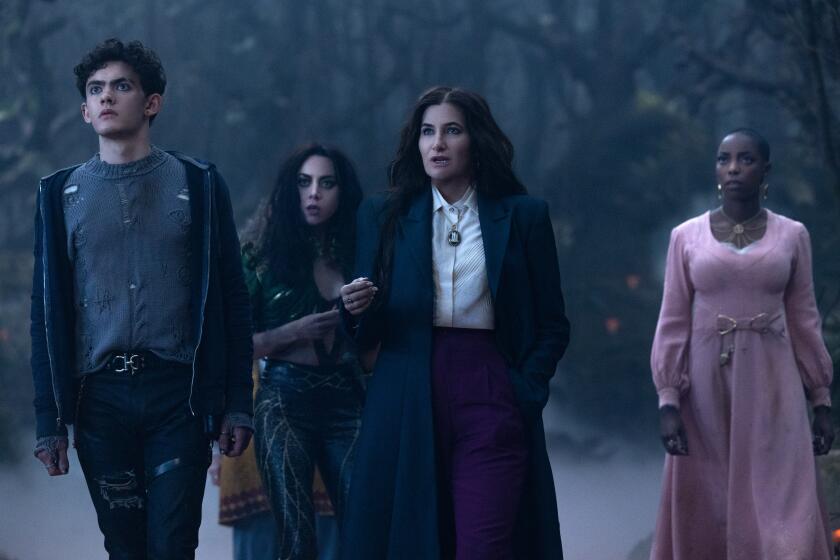A matter of life and death
THOSE who’ve sat through high school productions of Thornton Wilder’s “Our Town” might find it amusing to learn how daring the play seemed when it premiered in 1938 on Broadway. Yes, the old chestnut was once considered avant-garde. But that shouldn’t come as a complete surprise: Devoid of props and realistic scenery and indulging more in direct address than dialogue, the play departed radically from the naturalistic model that had dominated mainstream theater since the late 19th century. “It will probably go down as the season’s most extravagant waste of fine talent,” Variety scoffed in a review of an out-of-town tryout, annoyed by all the “experimental biz.”
It’s a credit to Wilder that we no longer think twice when we see a scene enacted in theatrical shorthand. His playful if somber allegory assured middle-class theatergoers that, even for works dealing with characters like themselves, dramatic locales needn’t be spelled out with a set full of Sears catalog furniture. And if an invisible telephone rings and an actor carries on a lengthy one-way conversation, there’s no reason to phone a psychiatrist.
As the Library of America’s new edition of Thornton Wilder’s “Collected Plays & Writings on Theater” makes clear, “Our Town” was the play he was destined to write. In fact, he wrote several versions of it throughout his career, the most notable of which can be found in “The Long Christmas Dinner & Other Plays in One Act,” a 1931 collection reprinted here. These tiny treasures are sometimes referred to as playwriting warmups for Wilder, who initially came to fame as a novelist (winning his first of three Pulitzers in 1928 for “The Bridge of San Luis Rey”). Short in length and long in buoyant theatricality, they deserve a dignified place beside the three major works on which his stage career rests, “Our Town,” “The Skin of Our Teeth” and “The Matchmaker.”
Like “Our Town,” the one-act play “Pullman Car Hiawatha” employs a character named Stage Manager to serve as master of ceremonies. The dramatic occasion is an overnight train ride from New York to Chicago in which passengers arrayed on portable chairs (representing separate berths) introduce themselves. All are caught up in securing their petty creature comforts or stewing about some past or prospective source of anxiety. One among them won’t make it, despite the presence of a doctor on board, a development that throws into relief the smallness of their blinkered obsessions. As night rolls on, the Stage Manager orchestrates a pageant (as affectionately bumbling as the one in Shakespeare’s “A Midsummer Night’s Dream”) that attempts to give voice to the music of the cosmos.
Drama critic John Gassner called “The Long Christmas Dinner” the “most beautiful one-act play in English prose” since Irish playwright John M. Synge’s “Riders to the Sea (1904).” Chronicling 90 years in the Bayard family, the Wilder play telescopes time even more rapidly than “Our Town” does and reveals the prevailing generational pattern of life, which is to say a stretch of baffled hope and love sandwiched between states of non-being. Two doors, one through which characters enter the world, the other through which they leave, lend an existential aspect to the usual business of entrances and exits. All the world was indeed a stage for Wilder -- and a perfect vehicle for contemplating the whole confounding shebang.
My preference in this group of far-reaching short plays is “The Happy Journey to Trenton and Camden.” Here, the drama revolves around a New Jersey couple’s car trip with two kids to visit a married daughter who lost her baby and nearly her own life in childbirth. Again, all that’s needed to set us on the road is a bunch of chairs and our collective imagination. Particularly moving is the open-ended way in which Wilder deals with his story. There’s no reaching for a moral, no psychological epiphany. He’s content to draw quotidian life, with its silly squabbles and negligible offenses, shadowed in varying degrees by the looming presence of mortality.
Death, of course, is Wilder’s great subject. (Speculators in biographical criticism, make of it what you will: Wilder’s twin died at birth.) Everywhere in his writing he urges us to be more mindful of its ultimate reality, even as he recognizes that too much awareness can make existence psychologically untenable. (Recall “Our Town” character Emily’s postmortem decision not to remain in the twilight memory of her girlhood.) In his gentle way, Wilder challenges us to appreciate experience more deeply, to honor the value of relationships and to take in the beauty of the world, ephemeral though it may be. At the same time, his work invites comparison with that of his contemporary Robert Frost, a poet who allows his reader to discover as much darkness as he or she can handle.
Wilder’s style is often described as “homespun,” but the simplicity is deceptive. His most original work crosses the medieval morality play with the modern meta-theatrical comedy. Populated with 20th century everymen and everywomen, his plays strive to render the universal through figures possessing just enough convincing individuality to tap into our deepest sympathies.
Wilder’s dramatic vision crystallized nowhere as completely as it did in “Our Town.” “The Skin of Our Teeth” (1942), ambitiously deriving inspiration from (of all things) James Joyce’s “Finnegans Wake,” overextends its anachronistic joke: A suburban New Jersey family relives the Ice Age and other near-apocalyptic disasters from pre-history and the Bible. “The Matchmaker” (1954), a revision of Wilder’s earlier “The Merchant of Yonkers” (1938), is perhaps his most popular work, thanks to its transformation into the 1964 musical “Hello, Dolly!” He adapted it from Austrian playwright Johann Nestroy’s 1842 farce “Einen Jux will er sich Machen” (“He’ll Have Himself a Good Time”), which was inspired by the 1835 British farce “A Day Well Spent.” Largely borrowed, “The Matchmaker” is what the French would call a boulevard comedy, and one could hardly describe it as his most ambitious undertaking. That said, the character Dolly Levi is Wilder’s invention, and her frank determination to seize as much goodness as she can from life despite its imperfections and pulverizing losses is the reason she’s his most memorable character.
What connects these disparate plays is their undisguised joy in the unabashedly theatrical moment. Each seems to spring from the same implicit question: Why be a naturalistic stick-in-the-mud when the stage offers such high-flying precedents?
Wilder, who spent part of his youth in Berkeley and had walk-on parts in productions at UC Berkeley’s Greek Theater, lived in Asia with his family, studied at a German school in China, translated French literature and attended the first performance of Luigi Pirandello’s “Six Characters in Search of an Author” (1921) while studying in Rome. He was, in short, an artist whose sensibility was rooted in world theater. As folksy as his plays may seem, there was nothing provincial about his mind. Indeed, he was one of the rare American playwrights who was also a literary intellectual.
But his impressive erudition, evident in his essay on Sophocles’ “Oedipus Rex” and others collected here on the nature of farce and of playwriting more generally, is discernible most acutely in his ability to master different forms as a writer. A novelist and a dramatist of terrific daring, he also succeeded as a screenwriter with “Shadow of a Doubt,” the 1943 Alfred Hitchcock film that the director later called his best movie, “from the point of view of suspense and character.”
“Talent,” French writer Jean Genet once remarked, “is courtesy with respect to matter.” Famously courteous, Wilder understood “matter” not just as subject but also as form. If the inextricability of death and life was his perennial theme, he approached it from different vantages, depending on the medium in which he was working. And though his contribution to drama may lag behind those of Eugene O’Neill, Arthur Miller and Tennessee Williams, Wilder has given license to playwrights as diverse as Edward Albee, John Guare and Paula Vogel to pursue their theatrical quarry with similar buoyancy, expansiveness and unstinting surprise. *
More to Read
The biggest entertainment stories
Get our big stories about Hollywood, film, television, music, arts, culture and more right in your inbox as soon as they publish.
You may occasionally receive promotional content from the Los Angeles Times.











